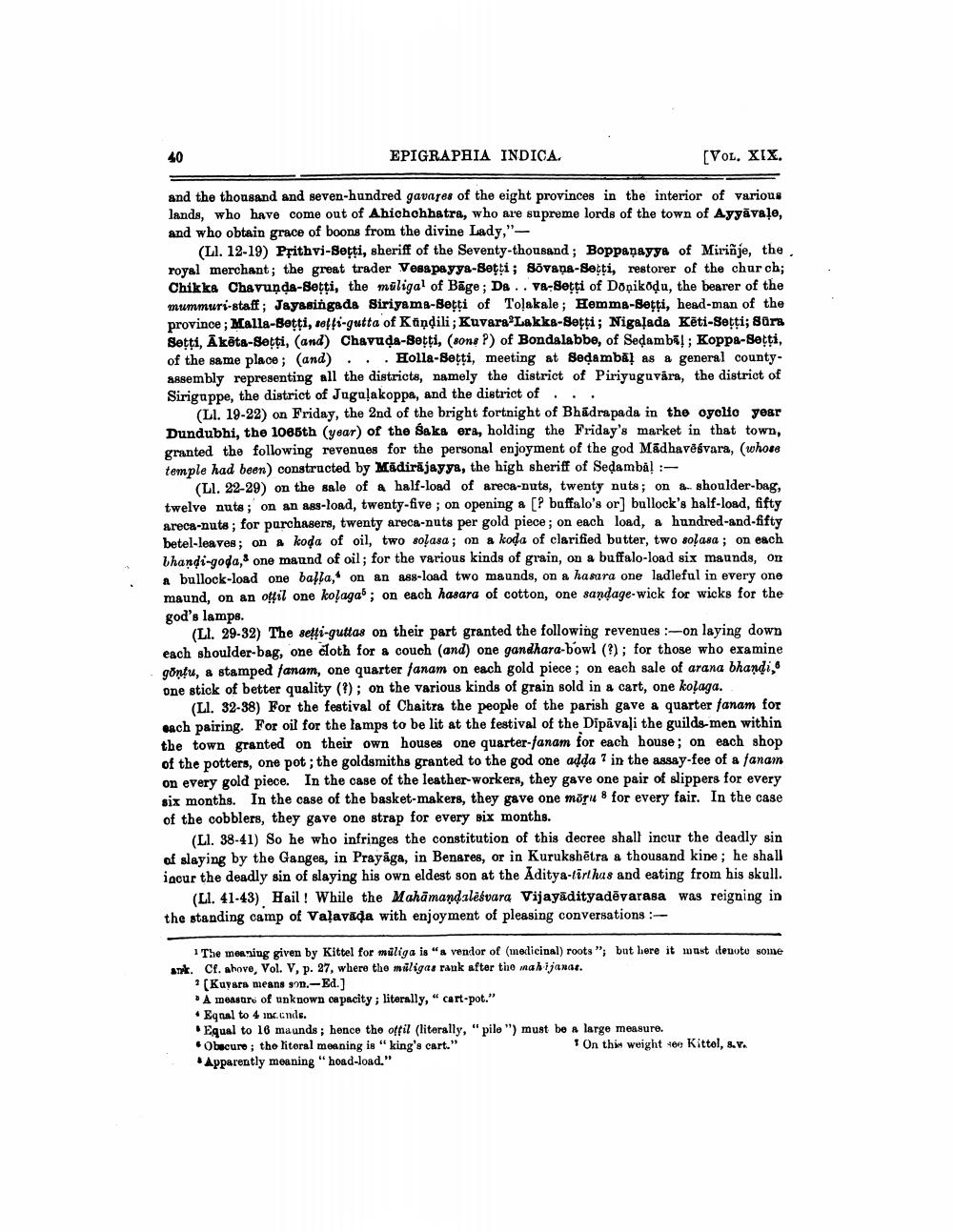________________
EPIGRAPHIA INDICA.
[VOL. XIX.
and the thousand and seven-hundred gavares of the eight provinces in the interior of various lands, who have come out of Abichohhatra, who are supreme lords of the town of Ayyavale, and who obtain grace of boons from the divine Lady,"
(LI. 12-19) Prithvi-Setti, sheriff of the Seventy-thousand; Boppanayya of Miriñje, the royal merchant; the great trader Vesspayya-Setti; Sovana-Setti, restorer of the church; Chikka Chavunda-Sotti, the mūligal of Bāge; De .. VA-Setti of Dopikodu, the bearer of the mummuri-staff; Jayasingada Siriyama-Setti of Toļakale; Hemma-Sotti, head-man of the province; Malla-Setti, soffi-gutta of Kandili; Kuvara Lakka-Setti; Nigaļada Kēti-Setti; Sara Setti, Ākëta-Sotti, (and) Chavuda-Betti, (sons ?) of Bondalabbe, of Sedambil: Koppa-Setti, of the same place; (and)... Holla-Setti, meeting at Sedambēļ as a general countyassembly representing all the districts, namely the district of Piriyuguvära, the district of Sirigappe, the district of Jugulakoppa, and the district of ...
(LI. 19-22) on Friday, the 2nd of the bright fortnight of Bhadrapada in the wyclio year Dundubhi, the 1085th (year) of the Saks era, holding the Friday's market in that town, granted the following revenues for the personal enjoyment of the god Madhavågvara, (whose temple had been constructed by Madirajayya, the high sheriff of Sedamba! :
(Ll. 22-29) on the sale of a half-load of areca-puts, twenty nuts; on a shoulder-bag, twelve nuts; on an ass-load, twenty-five ; on opening a [? buffalo's or] bullock's half-load, fifty areca-nuts; for purchasers, twenty areca-nuts per gold piece; on each load, a hundred-and-fifty betel-leaves; on A koda of oil, two solasa ; on a koda of clarified butter, two solasa ; on each thandi-goda, one maund of oil; for the various kinds of grain, on a buffalo-load six maunds, on a bullock-load one balla, on an ass-load two maunds, on a hasara one ladleful in every one maund, on an offil one kolaga; on each hasara of cotton, one sandage-wick for wicks for the god's lamps.
(LI. 29-32) The seffi-guttas on their part granted the following revenues :-on laying down each shoulder-bag, one doth for a couch (and) one gandhara-bowl (f); for those who examine gontu, a stamped fanam, one quarter fanam on each gold piece; on each sale of arana bhandi, one stick of better quality (?); on the various kinds of grain sold in a cart, one kolaga.
(LI. 32-38) For the festival of Chaitra the people of the parish gave a quarter fanam for each pairing. For oil for the lamps to be lit at the festival of the Dipávali the guilds-men within the town granted on their own houses one quarter-fanam for each house; on each shop of the potters, one pot; the goldsmiths granted to the god one adda 7 in the assay-fee of a fanam on every gold piece. In the case of the leather-workers, they gave one pair of slippers for every six months. In the case of the basket-makers, they gave one mör48 for every fair. In the case of the cobblers, they gave one strap for every six months.
(Ll. 38-41) So he who infringes the constitution of this decree shall incur the deadly sin of slaying by the Ganges, in Prayāga, in Benares, or in Kurukshētra a thousand kine; he shall iacur the deadly sin of slaying his own eldest son at the Aditya-tirthas and eating from his skull.
(LI. 41-43) Hail! While the Mahamandalesvara Vijayadityadēvarasa was reigning in the standing camp of Vaļavada with enjoyment of pleasing conversations :
The monsing given by Kittel for waliga is "& vendor of medicinal) roots", but here it must deuoto some amk. Cf. ahovo, Vol. V, p. 27, where the miligas rank after tio mahljanar.
? (Kuyara means son.-Ed.]
A measure of unknown capacity; literally, "cart-pot." • Eqnal to 4 inccnde. Equal to 16 maunds; hence the offil (literally, "pile") must be a large measuro. Obscuro; tho litoral morning is "king's cart."
On this weight 46 Kittel, B.V. . Apparently meaning "hoad-load."




